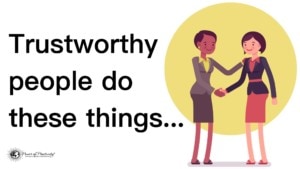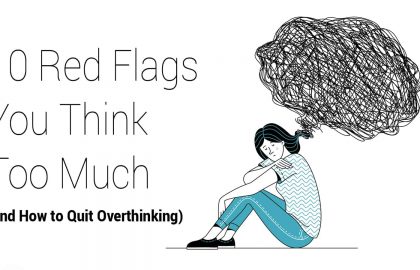Trust is an important part of any kind of relationship. However, trusting someone is hard when the world is filled with deceptive people.
In the book, “The Science of Relationships,” the experts wrote that trust, which entails a person’s hopes and aspirations, is put side by side with his fears and worries. No wonder you might be having trouble giving their trust completely because you know there’s a risk your closeness with someone might turn into betrayal.
Fortunately, life will give you red flags and warnings. Here are some signs that may indicate you cannot trust someone:
Here Are 9 Signs You Can’t Trust Someone
“Trust is earned when actions meet words.” – Chris Butler
1. If the person gossips about other people
It might seem like an innocent pastime at work or among your friends but gossiping has hurt and ruined a lot of relationships.
- Anyone who gossips to you about another person may easily gossip about you to other people, too.
- Some people might start gossiping as a way to vent about a colleague at work or a friend. But it would be very inappropriate for a boss to talk about another staff member with his peers.
- If your friends are judging someone else’s business, you don’t need to be in this circle.
- If you’re uncomfortable about hearing gossip, subtly say that you’d rather talk about this when the person involved is around so you can also hear their side.
To be completely fair to the other side, a study in the journal Psychoneuroendocrinology showed that there are positive effects to gossiping. It can strengthen bonds between friends or groups and it can also help you figure out who to trust.
2. If the person is not approachable or secretive
Do you work with someone who doesn’t seem to be approachable? Does he keep to himself and seem inaccessible when you have questions or concerns? Do you have a friend who’s a bit secretive and keeps information to herself, or avoids getting into a serious conversation?
- There’s a lot of reasons a person might have a wall around him. For this reason, it’s important to define the kind of secrecy a person demands.
- He might be secretive if he values his privacy and would like to impose boundaries that align with his belief.
- Being secretive might also be a way for an individual to protect himself or his interests from judgment, reprisals, or consequences.
The impact of the secrecy will depend on the information or detail that was hidden. It also depends on the type of relationship, because certain secrets do not have a place in committed relationships. Sneaky actions from your partner can immediately send your radar running wild, even if you’re not a suspicious person.
If you think that the other person is being secretive, try to approach the situation by inviting a dialogue or a serious conversation. If you allow the person to open up, then you’re giving him the opportunity to explain himself and prove that he can be trusted.
3. If they flip-flop
Now, people have the right to change their mind even on critical matters that may impact a lot of people. At work, for example, if your colleagues have the right facts, information, or data, they are entitled to veer in a different direction. In this case, flip-flopping arises from a necessity.
In other cases, however, it might be an indication of opportunism. It is hard to trust a flip-flopper who changes his stand due to pressure or convenience. It’s even harder when the person places the blame on you when something goes wrong.
Unfortunately, some flip-floppers look for scapegoats and behave without consideration. For instance, no matter how friendly you are with a colleague at work, your friendship will only come second when he’s under a lot of stress and pressure from the higher-ups. So, he’ll easily change his mind to please his superiors and leave you on the lurch.
In friendships, flip-floppers don’t have any qualms taking advantage of people. They may emotionally and financially drain you if you don’t set some boundaries. You might extend your help to a friend like this but eventually, being in a relationship with someone who can’t make a solid stand for what he values or who’s contradicting himself can be toxic. Don’t ignore the red flags.
4. If they are insecure
Some people with low self-esteem mask their insecurities by having an animated persona. They can be exuberant and over-eager to make their presence felt. As a result, anyone who’s getting more attention or recognition might be seen as a threat. So, they may behave in a petty manner and raise accusations against you even when you’re not doing anything wrong.
You cannot trust a person with insecurities because they can manipulate situations to favor themselves while avoiding issues or instances that might highlight their shortcomings or expose their vulnerabilities. As with flip-floppers, spending time with someone who’s insecure can become emotionally draining. You have to set boundaries as well, lest you become this person’s caretaker.
If this person is someone you have to face every day, it might help to sit down and have a heartfelt conversation about their pettiness and insecurities. In your discussion, don’t forget to stress the positive aspect of your relationship, whether it’s personal or professional. Also, try to do the following:
- Reassure the person that there’s no reason to be upset.
- Demonstrate that you are committed to your relationship or partnership.
- Emphasize that for this partnership to work, you have to trust each other.
- Explore past issues that might trigger why this person can behave irrationally.
- Show encouragement.
5. If they always agree with you
The very nature of people-pleasers is that they are untrustworthy. They are similar to flip-floppers who don’t have a stand or opinion on matters. The “Yes” person will always agree with what you say or do.
These people are motivated to say yes because they think it aligns with what you want from them. Don’t mistake this for being supportive though. Deep in the hearts of people-pleasers, they have different ideals and goals than yours.
If they cannot be authentic about their feelings, then how do you know if their support is sincere? Worse, people who always agree with you may end up resenting you because they were never able to express their true self around you.
A study from UC Berkeley stated that people-pleasers do not have any integrity and aren’t exactly fooling anyone. Those who think it’s beneficial to please others actually end up more stressed or anxious because inauthenticity can take its toll.
6. If they are cruel to their friends or colleagues
Good-natured ribbing between friends is common, especially if you’re familiar with each other. But in some cases, familiarity may also breed contempt. Teasing can quickly escalate into an abuse if the person who does the teasing has a strong or abrasive personality.
- People with abrasive personalities have a way of making others feel uncomfortable.
- They might lack empathy and are missing a sensitivity chip so they say the wrong words at the worst times.
- They may sound cruel and undermine the people in their inner circle or group.
- If they can behave like this with their friends, they will likely behave the same way towards you even if you’re just getting to know them.
The problem with abrasive people is that they often don’t know they are being cruel to someone. According to the Harvard Business Review, they need to be told over and over about the impact and reality of their actions. They might be too defensive to see how their behavior is costing friendships or the harmony in their relationships.
7. If they apologize with a “but…”
People who say, “I’m sorry, but….” are not in any way apologizing for whatever they’ve done. The “but” is an excuse and a justification, thus they will not likely change their ways or correct their mistake. They will not also own up to this mistake so they are bound to repeat it.
Politicians are notorious for non-apologies like this. It’s no wonder they have a hard time earning the people’s trust. Insincere apologies are the mark of people who don’t respect or value others, so why should you give this person your trust?
On the subject of apologies, sometimes it’s better not to apologize by saying the words. Sometimes an action to fix the problem is in order. People see a person’s authentic sincerity more through actions than words.
8. If they cannot give explanations
Any time someone blurts out the words, “Why should I have to explain everything to you?” it’s a red flag that this person might not be worthy of your trust. If he’s not willing to answer your questions or provide clarity on an issue that’s bugging you, then he is not being honest and may be hiding something.
If this is happening at work, it’s your right to ask questions. Requesting an explanation enables you to be properly guided in order to contribute better to the project. You won’t be able to do your work right if your boss doesn’t define what’s needed or give you needed resources and tools. If he withholds information altogether, you will end up not effectively completing the project at hand.
In a personal relationship, uttering the above phrase may sound defensive, especially if you were just asking a simple question. Don’t ignore the alarm bells that start ringing.
9. If they take credit for other people’s accomplishments
A credit-grabber falls in the same category as the one who flip-flops and the “Yes” man. This type of person will not think twice about throwing anyone under the bus to save their own skin. Such an attitude can breed distrust among a group or team.
If this happens to you though, here are a few steps you can take:
- There’s no better response towards someone who takes credit for your accomplishment except to take the high road.
- Don’t let this attitude affect you since her lies will likely be discovered sooner than later.
- Instead, find other opportunities to shine in your work and get recognized by the people who are higher than your boss.
- Volunteer or tag along in special projects that you know you can contribute to or give superiors regular updates and progress reports so that they know you are part of the contributing team.
Final Thoughts On Signs You Can’t Trust Someone
Trusting someone is often a judgment call. If you’ve taken note of these nine red flags carefully, you will be able to learn how to filter untrustworthy people out of your life. This way, you can protect yourself from becoming a victim of deception or unfair treatment.
The post 9 Signs You Can’t Trust Someone appeared first on Power of Positivity: Positive Thinking & Attitude.
Source – powerofpositivity.com






